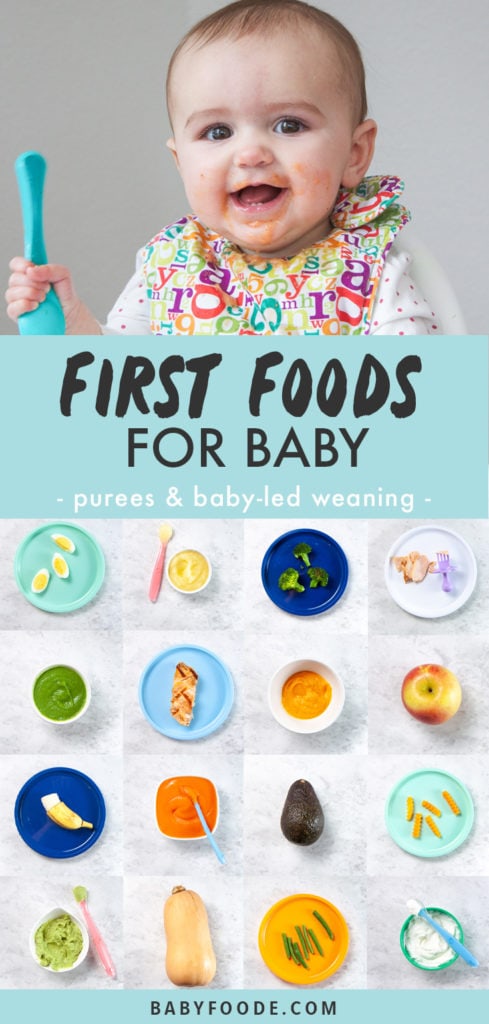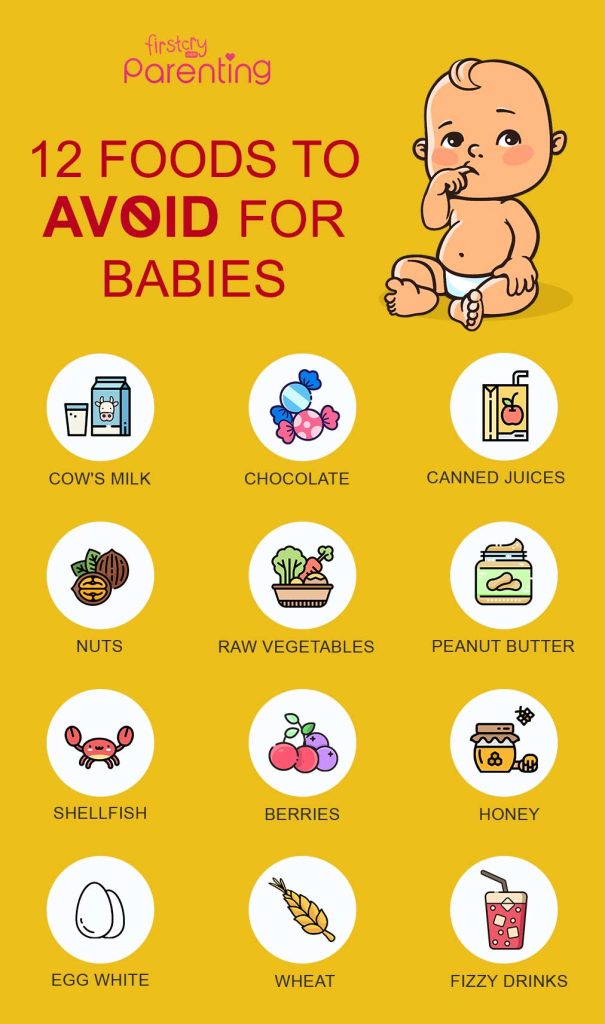The best first solid food for a baby is single-grain baby cereal, like rice cereal. It’s gentle on their digestive system.
Introducing solid foods to your baby is an exciting milestone. Single-grain baby cereal, particularly rice cereal, is often recommended as the first solid food. It is easy to digest and unlikely to cause allergies. Starting with a single-grain cereal helps parents identify any potential food sensitivities.
Gradually mixing the cereal with breast milk or formula creates a smooth transition from liquid to solid food. This initial introduction helps babies get accustomed to new textures and flavors. Remember to always consult with your pediatrician before introducing new foods to ensure the best choices for your baby’s health and development.
Introduction To Baby’s First Solid Food
Introducing your baby to solid foods is a big milestone. This stage is crucial for their growth and development. The right first solid food can set the stage for healthy eating habits.
Importance Of The First Food
The first solid food your baby eats is very important. It impacts their taste preferences and nutritional health. Choose a food that is easy to digest. This helps in developing their digestive system.
Offer foods rich in iron. Babies need iron for healthy brain development. Iron-fortified cereals are a good option. You can also try pureed meats or vegetables.
Introducing different textures is also key. Start with smooth purees. Gradually move to lumpier textures as your baby gets used to eating solids.
When To Start Solids
Babies are usually ready for solids around six months old. Look for signs of readiness. These include sitting up with support and showing interest in food.
Another sign is when they can hold their head steady. Your baby should also have lost the tongue-thrust reflex. This reflex pushes food out of their mouth.
Consult your pediatrician before starting solids. They can provide personalized advice. Start with one new food at a time. Wait a few days before introducing another. This helps in identifying any allergies.
| Signs of Readiness | Description |
|---|---|
| Sitting Up | Baby can sit with support. |
| Interest in Food | Baby shows interest in what you eat. |
| Head Control | Baby can hold their head steady. |
| Tongue-Thrust Reflex | Baby no longer pushes food out with their tongue. |
Signs Your Baby Is Ready
Introducing solid foods to your baby is a significant milestone. Knowing the signs your baby is ready can help make this transition smoother and more enjoyable for both you and your little one. Recognizing these signs ensures that your baby is physically and behaviorally prepared to start solids safely.
Physical Readiness
Physical readiness is crucial before introducing solids. Look for these key indicators:
- Head Control: Your baby can hold their head up steadily.
- Sitting Up: Your baby can sit up with minimal support.
- Tongue Thrust Reflex: The reflex that pushes food out of the mouth is diminished.
If your baby shows these signs, they might be ready for their first taste of solids.
Behavioral Indicators
Behavioral indicators also play a critical role in determining readiness. Watch for these behaviors:
- Interest in Food: Your baby watches you eat and shows curiosity.
- Reaching for Food: Your baby tries to grab food from your plate.
- Increased Appetite: Your baby demands more frequent milk feedings.
These behavioral signs suggest that your baby is eager to explore new tastes and textures.
Nutritional Needs Of Infants
Understanding the nutritional needs of infants is crucial for their growth. Babies require a well-balanced diet to ensure proper development. Introducing the right solid food helps meet these needs.
Essential Nutrients
Babies need a variety of essential nutrients to thrive. These include:
- Proteins: Build and repair tissues
- Iron: Important for blood and brain development
- Calcium: Essential for strong bones and teeth
- Vitamins: Support overall health and immunity
- Fats: Provide energy and support brain growth
Each nutrient plays a vital role in your baby’s health. A balanced diet ensures they get all these nutrients.
Balanced Diet For Babies
A balanced diet for babies includes different food groups. Here is a simple guide:
| Food Group | Examples |
|---|---|
| Fruits | Bananas, Apples, Pears |
| Vegetables | Carrots, Sweet Potatoes, Peas |
| Grains | Rice, Oatmeal, Barley |
| Proteins | Chicken, Fish, Lentils |
| Dairy | Yogurt, Cheese |
Offering a variety of foods helps meet your baby’s nutritional needs. Introduce one new food at a time. Watch for any allergic reactions. Keep the diet colorful and diverse.

Credit: www.facebook.com
Best First Foods For Babies
Introducing solid foods to your baby is an exciting milestone. Choosing the right first foods can set the stage for healthy eating habits. Here are some of the best first foods for babies.
Single-grain Cereals
Single-grain cereals are often recommended as the best first food for babies. They are easy to digest and fortified with essential nutrients like iron. Here are some popular choices:
- Rice cereal: A gentle option for sensitive stomachs.
- Oatmeal: Rich in fiber and helps with digestion.
- Barley: Nutritious and less likely to cause allergies.
Mix these cereals with breast milk or formula to a smooth consistency.
Pureed Vegetables And Fruits
Pureed vegetables and fruits are another excellent choice for first foods. They offer vitamins and minerals essential for growth. Here are some top picks:
| Vegetable | Fruit |
|---|---|
| Carrots: Rich in vitamin A and easy to puree. | Bananas: Soft texture and full of potassium. |
| Sweet Potatoes: Packed with nutrients and naturally sweet. | Apples: Mild flavor and easily digestible. |
| Peas: High in vitamins and easy to mash. | Pears: Gentle on the stomach and hydrating. |
Steam and puree these vegetables and fruits until smooth. Always introduce one new food at a time and watch for any allergic reactions.
Homemade Vs. Store-bought
Choosing the best first solid food for your baby can be challenging. You can make baby food at home or buy it from the store. Each option has its own benefits and drawbacks.
Pros And Cons Of Homemade
| Pros | Cons |
|---|---|
| Control over ingredients. You know exactly what goes into your baby’s food. | Time-consuming. Making food at home takes time and effort. |
| Freshness. You can ensure the food is fresh and free from preservatives. | Storage. Homemade food has a shorter shelf life. |
| Cost-effective. Homemade baby food can be cheaper. | Consistency. Achieving the right texture can be difficult. |
Advantages Of Store-bought
- Convenience. Store-bought baby food is ready to use.
- Variety. Many flavors and textures are available.
- Consistency. The texture is always smooth and safe for babies.
- Long shelf life. Store-bought food lasts longer due to preservatives.

Credit: www.pinterest.com
Allergies And Food Sensitivities
Introducing solid foods to your baby is an exciting milestone. However, it comes with its own set of challenges, especially regarding allergies and food sensitivities. Understanding how to introduce allergenic foods can help prevent adverse reactions and keep your baby safe.
Common Allergens
Some foods are more likely to cause allergies in babies. Here are the most common allergens:
- Peanuts
- Tree nuts (almonds, cashews, walnuts)
- Eggs
- Milk
- Soy
- Wheat
- Fish
- Shellfish
These foods should be introduced carefully. It’s important to watch for any signs of allergic reactions.
Introducing Allergenic Foods
When introducing allergenic foods to your baby, follow these steps:
- Introduce one allergenic food at a time.
- Wait three to five days before introducing another.
- Start with a small amount, like a teaspoon.
- Observe your baby for any signs of allergies.
Signs of an allergic reaction include:
- Rash or hives
- Swelling of the lips or face
- Vomiting or diarrhea
- Difficulty breathing
If you notice any of these symptoms, stop feeding the food immediately. Consult your pediatrician for further guidance.
Feeding Tips And Techniques
Introducing your baby to solid foods is a big step. It’s important to ensure this journey is safe and fun. Here are some feeding tips and techniques to help you get started.
Safe Feeding Practices
Safety comes first when feeding your baby solid foods. Follow these practices to ensure a safe mealtime.
- Always supervise: Never leave your baby alone while eating.
- Small portions: Start with small, manageable bites to avoid choking.
- Soft textures: Make sure food is soft and easy to swallow.
- Avoid allergens: Introduce new foods one at a time to watch for allergies.
Making Mealtime Enjoyable
Mealtime should be a pleasant experience for both you and your baby. Here are some techniques to make it enjoyable.
- Be patient: Allow your baby time to explore and taste.
- Use colorful dishes: Bright plates can make food more appealing.
- Stay calm: Your baby can sense stress, so keep mealtime relaxed.
- Interactive feeding: Let your baby touch and play with their food.
Expert Recommendations
Choosing the best first solid food for your baby can be overwhelming. Experts offer valuable insights to guide parents in making informed decisions. Below are some expert recommendations from pediatricians and nutritionists.
Pediatricians’ Advice
Pediatricians often recommend single-grain cereals as a baby’s first solid food. These cereals are gentle on a baby’s digestive system. They are also fortified with essential nutrients like iron.
Here are some benefits of single-grain cereals:
- Easy to digest
- Low risk of allergies
- Iron-fortified
Pediatricians suggest starting with rice cereal. Then, you can introduce oatmeal or barley cereals. Mix the cereal with breast milk or formula to a thin consistency.
| Type of Cereal | Benefits |
|---|---|
| Rice | Easy to digest, low allergy risk |
| Oatmeal | High fiber, good for digestion |
| Barley | Rich in vitamins and minerals |
Nutritionists’ Tips
Nutritionists emphasize the importance of introducing vegetables early. Starting with vegetables can help babies develop a taste for them.
Some recommended first vegetables include:
- Sweet potatoes
- Carrots
- Peas
These vegetables are easy to puree. They are also rich in vitamins and minerals.
Here is how to prepare sweet potato puree:
- Peel and chop a sweet potato
- Steam until soft
- Blend with a little water
Nutritionists also advise introducing a variety of textures. This helps babies adapt to different foods as they grow.
Remember to introduce one new food at a time. This helps in identifying any allergic reactions.

Credit: babyfoode.com
Frequently Asked Questions
What Is A Good First Solid Food For A Baby?
A good first solid food for a baby is iron-fortified single-grain cereal mixed with breast milk or formula. Start with small amounts.
What Are The Best First Hand Foods For Baby?
The best first foods for a baby include pureed fruits, vegetables, and iron-fortified cereals. Offer small, soft pieces of banana, avocado, and sweet potato. Ensure foods are smooth and easy to swallow.
What Are Stage 1 Baby Foods?
Stage 1 baby foods are pureed foods ideal for infants aged 4-6 months. They include single-ingredient options like apples, carrots, and peas.
What Foods Can A 7 Month Old Eat?
A 7-month-old can eat pureed fruits, vegetables, mashed bananas, avocados, small amounts of soft-cooked grains, and pureed meats. Always introduce one new food at a time. Avoid honey, cow’s milk, and choking hazards like nuts. Ensure foods are soft, small, and easy to swallow.
Conclusion
Choosing the best first solid food for your baby is crucial. Start with single-ingredient, iron-rich foods like pureed meats or cereals. Always consult your pediatrician before introducing new foods. Monitor for allergies and ensure a balanced diet. Your baby’s health and happiness depend on these early nutrition choices.


